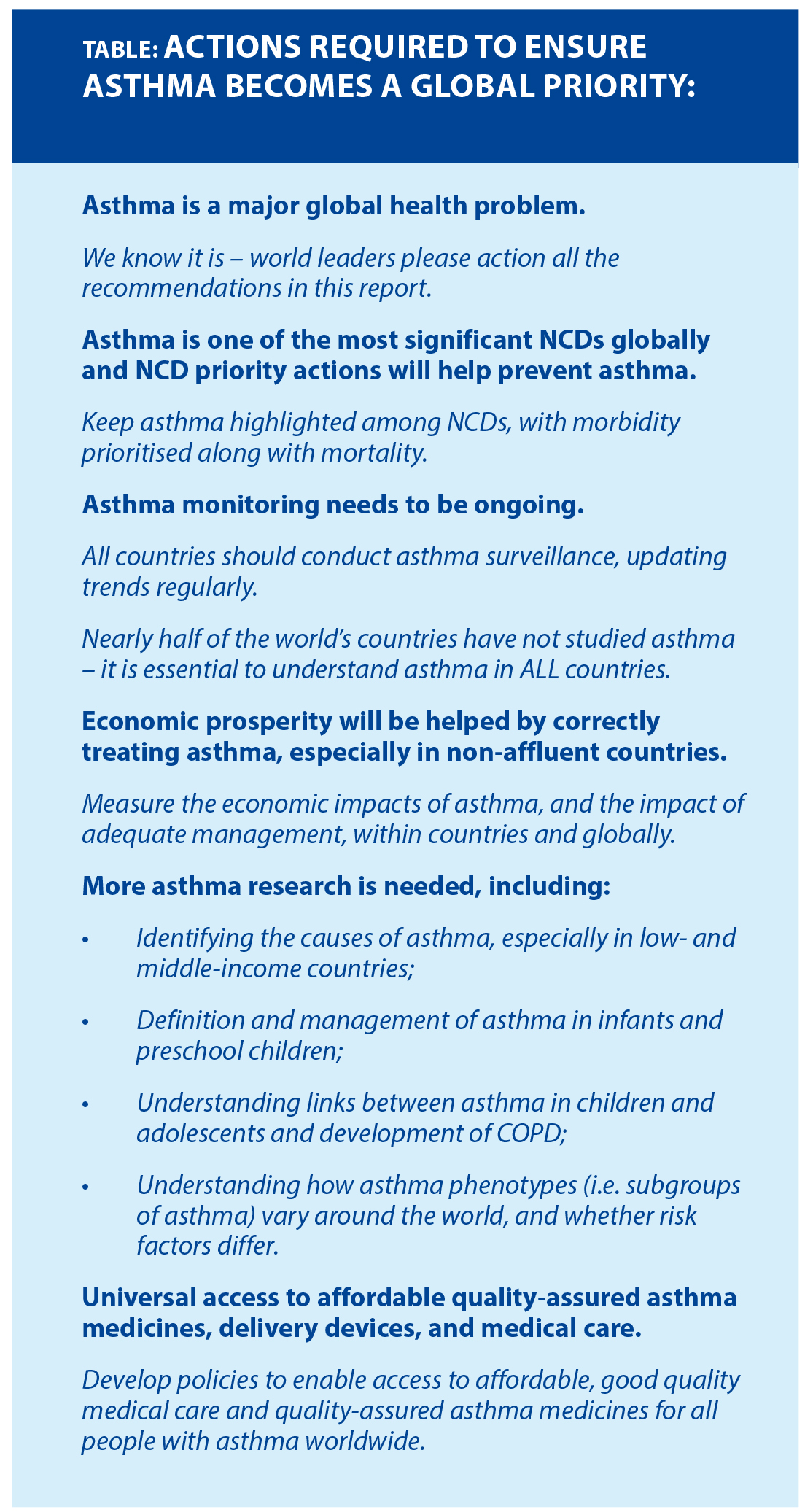
Asthma as an NCD Priority
The asthma epidemic experienced by high-income countries over the past 30 years is an increasing problem in low- and middle-income countries (LMICs) as they become more urbanised. Non-communicable diseases (NCDs), including asthma, have emerged as a major global public health problem. There are current challenges facing asthma surveillance, prevention, and management worldwide for which solutions are suggested here.
Asthma is an important NCD
Asthma has become an issue of international development as its economic and social costs have been recognised. Whilst communicable diseases such as pneumonia, tuberculosis, HIV and malaria are still major health problems for many LMICs, NCDs have emerged as a serious problem. Authorities believe that NCDs will be responsible for tomorrow’s pandemics. The majority of people with NCDs live in LMICs, and in some LMICs asthma is more common than in high-income countries.
Globally, NCDs outstrip communicable diseases as the leading cause of death. Forty million deaths, or 70% of all deaths worldwide, are attributable to NCDs, with 80% occurring in developing countries. Chronic respiratory diseases (CRDs), including asthma, cause 15% of world deaths. Many CRDs have their origins in childhood illnesses, including asthma, which tobacco smoke exposure may aggravate.
In 2011, 2014 and 2018 the United Nations (UN) High-level Meetings on NCDs recognised the global importance of NCDs and advocated solutions. This NCD work by the UN preceded, and is separate from, the UN Sustainable Development Goals (Chapter 17). Following the 2011 UN Summit on NCDS, the World Health Organization (WHO) identified the burden and suffering caused by CRDs as a priority issue, publishing the WHO Global Action Plan for the Prevention and Control of NCDs 2013-2020, and the WHO NCD Global Monitoring Framework. These included five interventions to tackle NCDs. Two of these – tobacco control, and essential medicines and technologies – will directly reduce the burden of asthma. A third priority aimed at reducing obesity – improved diets and physical activity – is likely to be beneficial for asthma as a relationship between obesity and asthma is becoming evident. The actions required to make asthma a greater NCD priority are summarised in the Table.
Surveillance of asthma and its determinants
We know that asthma is a serious global health issue because health researchers (paediatricians, respiratory physicians and epidemiologists) in 306 centres in 105 countries, wanting to estimate how large the problem was for children in their locality, joined the International Study of Asthma and Allergies in Childhood (ISAAC) research programme. ISAAC found that asthma affects about one in seven of the world’s children. Through ISAAC (children) and the European Community Respiratory Health Survey (ECRHS) (adults), and with the recent estimates from the Global Burden of Disease (GBD) Study, we know that asthma is an important NCD (Chapter 3). WHO has resolved that there needs to be “better surveillance to map the magnitude of CRDs and analyse their determinants with particular reference to poor and disadvantaged populations and to monitor future trends”. Thus, surveillance of asthma is globally relevant, and can be achieved on a regular basis by the use of simple instruments. The work of ISAAC is continued by the Global Asthma Network (GAN), with many locations currently conducting GAN Phase I (Chapter 1), which will provide updated prevalence, severity and risk factor information in children and adolescents, as well as new data in adults, and will explore management approaches.
Asthma research in the context of NCDs
Asthma research lags behind research for other NCDs, such as cardiovascular disease, and needs further investment. A key challenge is to identify modifiable environmental risk factors suitable for public health interventions that can reduce the morbidity and severity of asthma worldwide. An important emerging problem is preschool asthma and recurrent wheeze in infants, which is highly prevalent and has greater severity in developing countries.
Medicines for asthma
Universal access to affordable, quality-assured medicines for NCDs is essential. The WHO NCD Global Action Plan 2013-2020 set an 80% target for availability of essential NCD medicines in public and private facilities by 2025, but this is not being achieved for asthma. Access to affordable medicines, appropriate to the severity of their asthma, is needed – a β2-agonist reliever for all people with asthma, and an inhaled corticosteroid (ICS) preventer for those with more frequent symptoms. These essential medicines, particularly ICS, are not available or affordable to many patients or the health service in many countries (Chapter 10). Those who are undertreated become disabled, missing increased days of school or work, or die from asthma. Thus, asthma is a factor increasing poverty for individuals and countries, particularly LMICs.
Health services for asthma as an NCD
Another obstacle for the management of NCDs, including asthma, is the lack of health services organisation for long-term management of patients requiring regular follow-up. In many settings, asthma and other NCD treatment only occurs in an emergency. To reduce the burden of NCDs, governments must commit to addressing ‘neglected NCDs’, such as asthma, organise health services and train healthcare personnel to effectively diagnose and manage asthma and other NCDs at a primary or secondary care level.
Next: Asthma and the UN’s Sustainable Development Goals 2030 >

